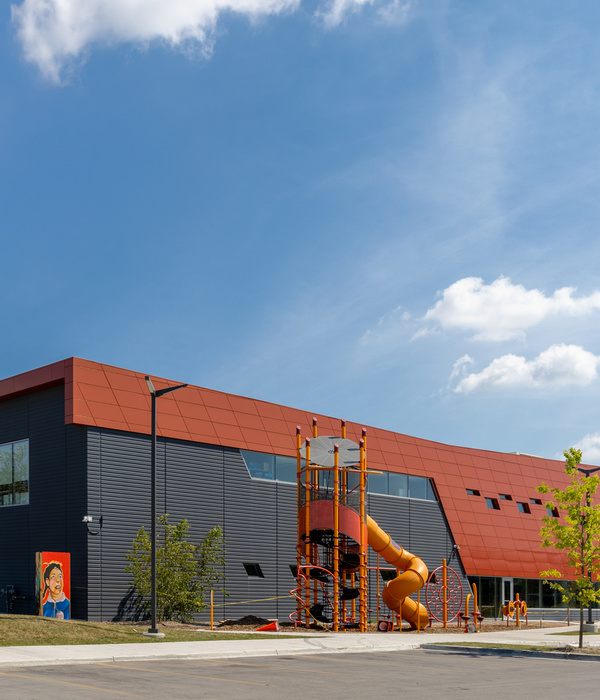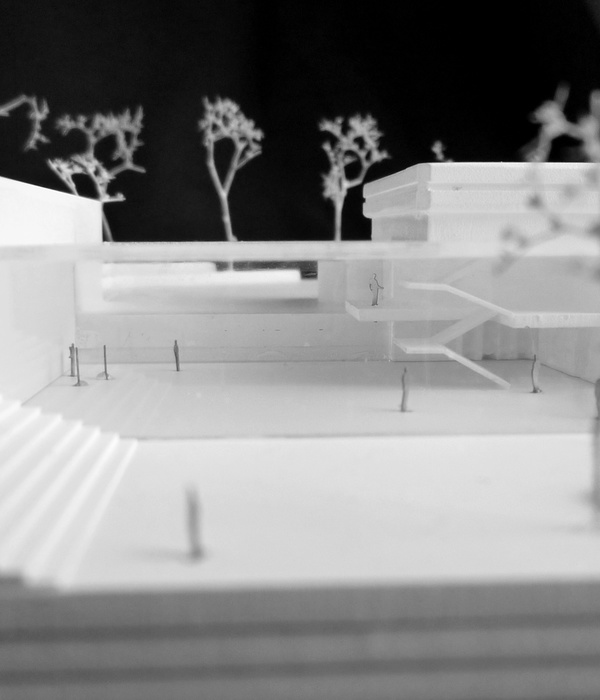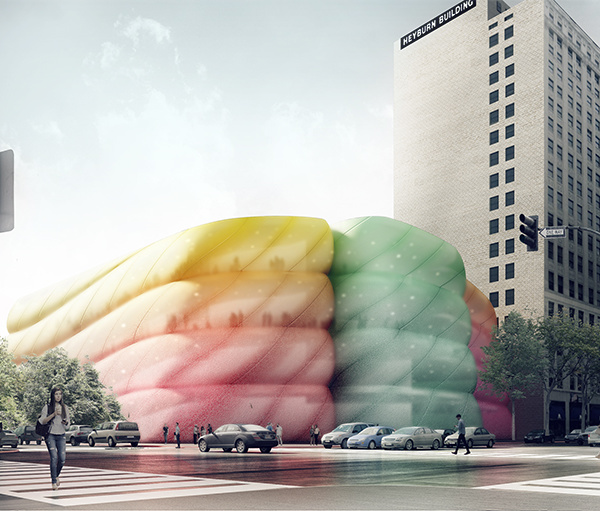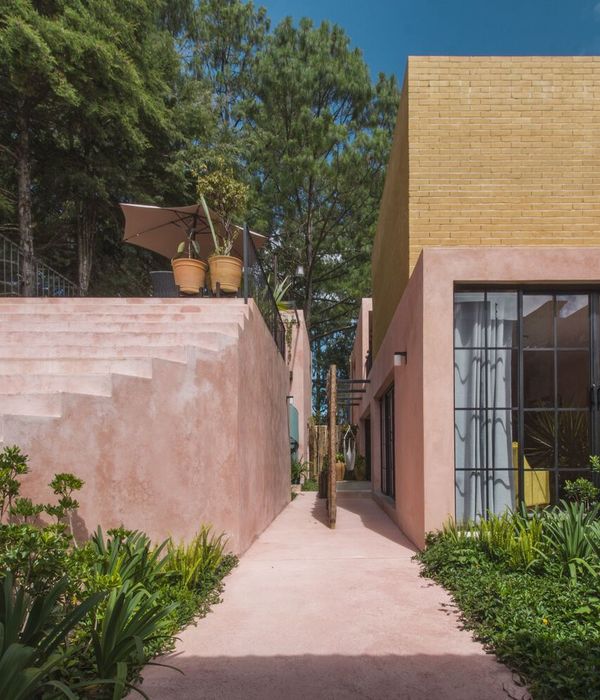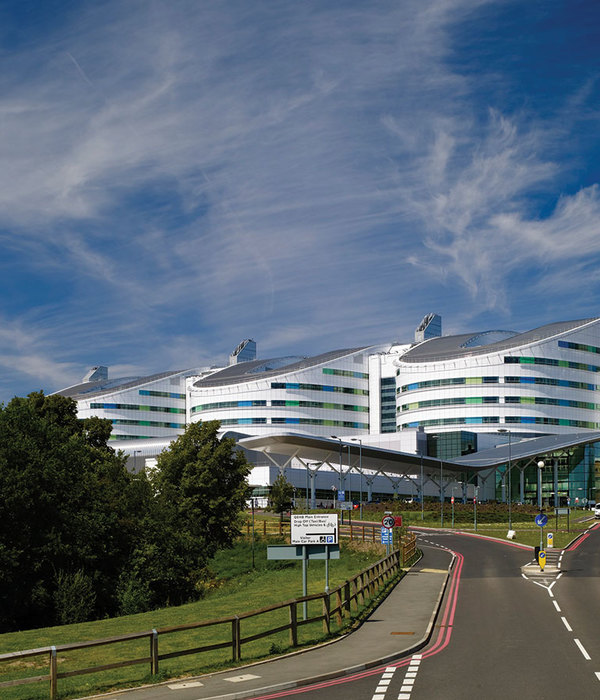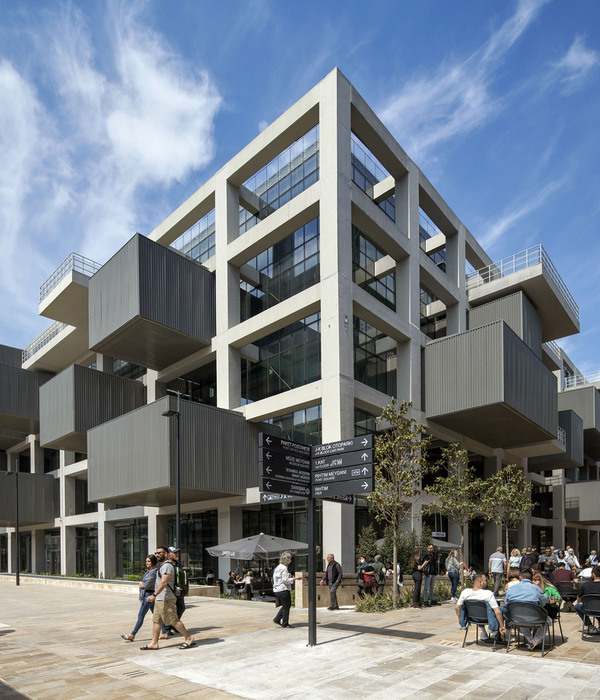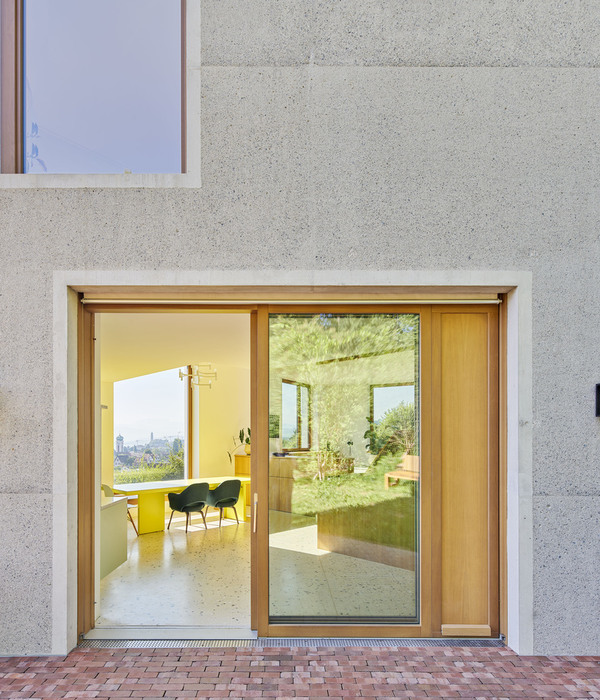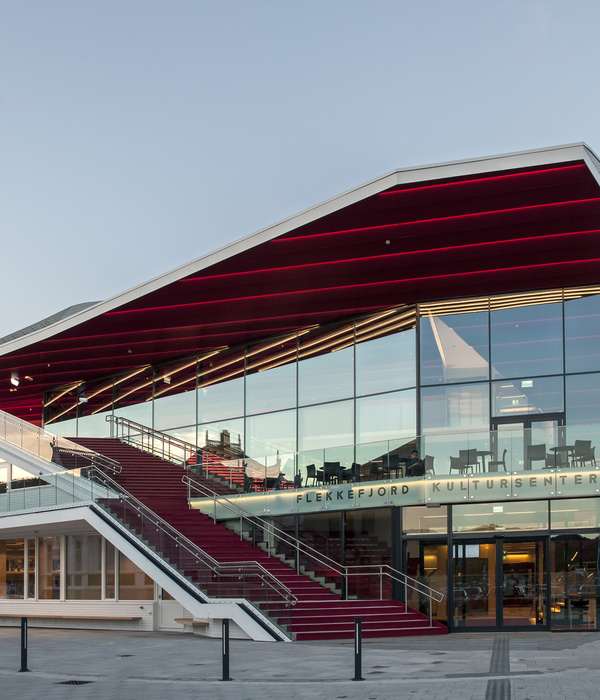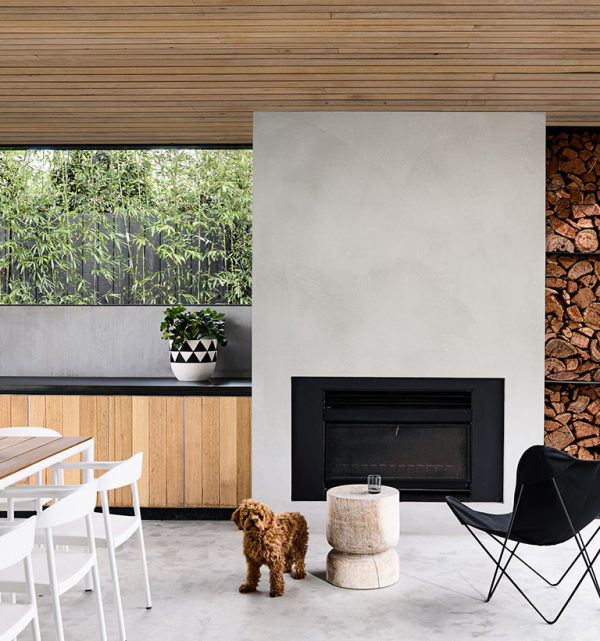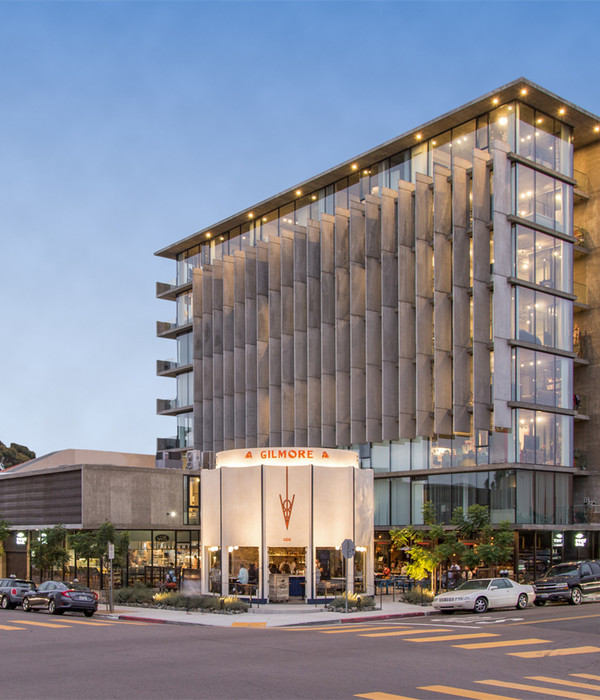2019年是建筑事务所Dominique Perrault Architect与欧洲法院(European Court of Justice)合作的第25年。截止至2008年,法院的第四期扩建工程(也被称为“大扩建工程”, the Great extension)已经完工。而随着欧盟的扩大,法院的第五期扩建工程也将于2019年9月落成,完工后的项目将成为场地上的第三座塔楼。
2019 celebrates 25 years of collaboration between Dominique Perrault and the European Court of Justice, initiated with the 4th extension (the Great extension) of the courthouse, completed in 2008. As completion of an architecture that grew up with the enlargement of the European Union, the 5th extension, encompassing a new and third tower, will be inaugurated in September.
▼项目远景鸟瞰图,distant bird-eye’s view of the project
1951年,根据“巴黎条约”(Treaty of Paris),现欧盟的前身——欧洲煤钢共同体(ECSC)正式创立,最初拥有6个成员国。这一年,也标志着欧洲法院拉开了其历史的帷幕。最初的法院建于1973年,由来自卢森堡的建筑师Jean-Paul Conzemius与来自比利时的建筑师Francis Jamagne和Michel Vander Elst共同设计完成,随着时间的推移和时代的发展,不知不觉中,欧洲法院迎来了其历史上的三次扩建工程,均由来自卢森堡的建筑师Bohdan Paczowski和Paul Fritsc负责。值得一提的是,这三次扩建工程都以一个重要的城市规划为基础——将一个功能单一的欧洲地区转变为一个拥有着街道和公共空间的卢森堡城市空间。二十多年来,Dominique Perrault与Gaëlle Lauriot-Prévost一道,致力于这个城市空间的扩建工程。本项目,即欧洲法院的第五期扩建工程,是整个扩建工程的最后一期,将成为场地上的第三座塔楼,作办公楼使用,以期为包括法务和语言研究等在内的行政部门提供办公空间,同时在顶层设置一个观景台,为人们提供一系列公共设施、新入口和公共空间。此外,在基地的东北侧,还将开发一个“多语种交流花园”。
Created with the Treaty of Paris in 1951, the European Coal and Steel Community (ECSC) –with 6 members- will give birth to the current European Union. This symbolic year sealed the European Court of Justice History. The architectural whole, from the initial courthouse inaugurated in 1973 and designed by the architects Jean-Paul Conzemius (Luxemburg), Francis Jamagne and Michel Vander Elst (Belgium), to the three times extended Court by the Luxembourgian architects Bohdan Paczowski and Paul Fritsch, is likewise rooted in an urban planning which has define the transformation of a mono- functional European district into a Luxembourgian city district with its streets and public spaces. For more than twenty years, Dominique Perrault, with Gaëlle Lauriot-Prévost, devotes himself to the Great Extension of this unique institution. Last expansion phase of the courthouse, the 5th extension includes a third office tower to host the administrative departments, including the lawyer-linguists, with a belvedere at its top level, facilities, new entries and public spaces. A “multilingualism garden” will be also developed at the North-East part of the site.
▼远景鸟瞰图,本项目的塔楼体量由一个金色体量和一个黑色体量构成,distant bird-eye’s view, the tower is composed of a gilded volume and a black volume
作为整个扩建工程的最后一期,本项目包括了两个相互连接的体量:一个全新的塔楼(由一个金色体量和一个黑色体量构成)及其裙房体量。这个塔楼是场地上的第三座塔楼,为包括法务和语言研究等在内的行政部门提供办公空间,同时在顶层设置一个观景台,为人们提供一系列公共设施、新入口和公共空间。新的塔楼在形式上与第四期工程中已建成的两座塔楼保持一致。它采用了前两个塔楼细长而连续的形式,在高度上额外增加了六层空间。同时,与其他两座塔楼方形的平面造型相比,本项目在平面上略微错位。这样的设计手法最大限度地利用了基地的朝向,同时与建筑西侧的第三期扩建工程(于1993年完成)相呼应,标志着自此,整个扩建工程完全竣工。
▼项目轴测图,新的塔楼在形式上与已建成的两座塔楼保持一致,并在平面上略微错位,the axon, the new tower rises in continuity with the first two towers and is slightly off-set
Last expansion phase of the project, the 5th extension includes two interlocked entities: the new tower and his base. The third tower hosts the administrative departments, including the lawyer-linguists, with a belvedere at its top level, new entrances, facilities and public spaces. The new tower rises in continuity with the first two towers built during the 4th extension. It takes the form of two slender and contiguous towers with six additional levels. Its location is slightly off-set compared to the orthogonal overall plan. Such an implementation optimizes the orientations, echoes the volume from the third extension (1993), at the western end of the building, and thus marks the completion of the architectural ensemble.
▼近景鸟瞰图,close bird-eye’s view of the project
建筑的裙房坐落于一片倾斜的基地上,屋顶位于Charles-Léon Hammes街上,标高与塔楼的首层持平,地面标高则与画廊的首层空间持平。这个裙房不仅对现有画廊进行了扩建,更通过在其中加建一座大型楼梯,将现有画廊与街道层的入口直接联系起来。同时,室外空间也与整个场地的风格保持一致。大型的楼梯则连接着Fort Niedergrünewald和Hammes,它们分别位于基地高点和低点。
基地的一侧布置着由石笼组成的绿化墙,该绿化墙沿着Fort Niedergrünewald的街道延伸,使得项目在水平方向上能够与街道达到一种平衡感。在平坦的空地上,一个小广场毗邻着建筑东北立面,限定出建筑的入口。此外,在基地的东北侧,还将开发一个“多语种交流花园”。
Embedded in a sloping ground, the base is located between a high point at Charles-Léon Hammes Street, on the ground floor of the tower, and a low point on the ground floor of the gallery. The base allows the extension of the current gallery and the construction of a large internal staircase for a direct connection between the existing gallery and the street access level. The outdoor spaces are also arranged in coherence with the whole site. Large stairs connect the streets of Fort Niedergrünewald and Hammes between the high and low access points.
A green wall composed of gabions, forming steps to adapt the level of the project to that of the street, runs along the street of Fort Niedergrünewald. On the esplanade, a small square beside the north-east facade marks the new entrance. A “Garden of Multilingualism” will be also developed at the north-east part of the site.
▼裙房,上设有天窗,the base with skylights © Georges Fessy
▼室内空间,interior view © Georges Fessy
本项目在形式上与前两座相邻塔楼相似。塔楼由两个细长的体量组成。金色的体量呼应了现有两座塔楼的外观,其外立面由一系列120厘米宽的模块随机组合而成,有时候呈现出金属丝网般的透明感,有时候则是不透明的实墙。由黑色珐琅玻璃构成的体量比金色体量高出15米,进一步呼应了环绕着现有法院大楼的环形建筑。
The third tower takes the form of two contiguous towers. Gilded, the first volume evokes the appearance of the two existing towers. The facades are a random composition of modules of 120 cm wide, sometimes transparent, with incorporated gold mesh, or sometimes opaque. The second volume of black enamelled glass, 15 meters higher, more evokes the “Ring” building that encircles the existing Courthouse.
▼项目外观,金色的塔楼体量时而呈现出透明感,时而是不透明的实墙,exterior view of the project, the facade of the gilded volume sometimes presents transparent with incorporated gold mesh, or sometimes opaque © Georges Fessy
本项目就像一座钟楼一样,在整个场地中创造出一个标志性的元素。第三座塔楼不仅参考并呼应了场地上前两座塔楼的形式,更产生了一种具有象征性的综合体量,让人不禁想起曾经的重工业和法院的历史。
Like a campanile, the new tower creates a marker element for the entire site. Merging two architectural references of the site, the third tower produces a symbolic alloy, which can evoke the heavy industry, echoing the founding events of the Court of Justice of the European Union, in the Europe of coal and steel.
▼项目入口夜景,night view of the entrance © Georges Fessy
▼总平面图,site plan
▼首层平面图,ground floor plan
▼上层平面图,plans of the upper floor
▼立面图1,elevation 1
▼立面图2,elevation 2
▼剖面图1,section 1
▼剖面图2,section 2
Conception : 2014 Construction : 2016-2019 Localisation : Kirchberg Plateau, Luxembourg Site area : 10.000 m² Built area : 50.000 m² Built volume : 181.000 m3 Height of the tower : gilded part : 103m from the gallery level / 27 floors; black part : 118m from the gallery level / 30 floors + technical terrace Client : Ministry of Sustainable Development ; Administration of Public Buildings, Luxembourg Architect : Dominique Perrault, France Art direction : Gaëlle Lauriot-Prévost, France Project manager : David Agudo Project team: Pedro Araujo, Marcello Biffi, Marine Girault, Anaïs Fernon, Lars Plugge, Leia Gorra. Operational project management : SRA Architects, Paris / Jean Petit Architects, Luxembourg Civil engineers : Ney & Partners, Luxembourg Technical support engineers : Felgen et Associes Engineering S.A., Luxembourg Energy experts : Sorane S.A., Switzerland Acoustic studies : Betavi Ingénieurs Conseils S.A., Luxembourg Façades studies : Terrell, France Technical control board : Secolux S.A., Luxembourg Safety coordinator : D3 Coordination S.A., Luxembourg BREEAM certification : Pricewaterhouse Coopers, Luxembourg Lighting expert : Jean-Paul Lamoureux Environmental certifications : class AAA, passive level, according to the Grand-Ducal regulations, «excellent» level according to the BREEAM certification.
{{item.text_origin}}

